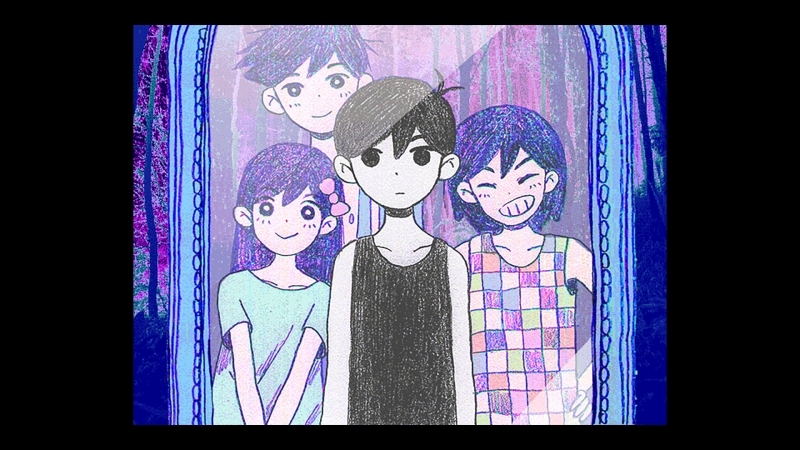
For transparency, I should say that I had no idea Omori existed until this January. I wasn’t following the game’s interminable development from its Kickstarter in 2014 to its release last Christmas. After finishing the game, however, I really should have. The game is lauded from those in the know, yet I never heard a mention of it until I saw Nitro Rad’s video. He’s one of my favorite game critics, and his review of Anodyne 2 got me hooked on what became my game of the year in 2019. With Omori, that scenario may just repeat itself.
Omori is an outwardly simple game with a multitude of hidden layers. It balances psychological horror, comical role-playing hijinks, and emotional gut punches in equal measure. Taking the form of a dreamy RPG, Omori puts the player through increasingly tough moments where it explores how old traumas lead to new tragedies. One could take any number of angles when discussing the game’s themes and symbols, but given my personal area of expertise, I want to tackle a specific one in depth:
By expanding on the signifiers found in its progenitors with greater depth and maturity, Omori is not only reminiscent of the Mother series, but the true successor that fans wished for.
Woof. And I thought I was done with college essays.
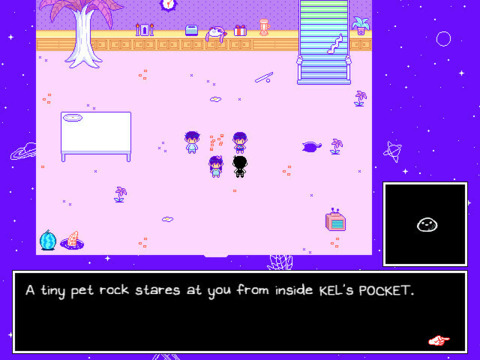
You don’t have to look hard to find echoes of Earthbound in Omori. Its pixel art and coloring is the same style that game publications derided in the 90s but adore now. A present with a red bow sits in one of the first rooms (though watermelons are this game’s treasure chests). There’s a race of wacky bulbous oddities that, sans the big honker, look just like Mr. Saturn in silhouette. The game’s premise, a dream world where real-life friends and neighbors live in fantasy, is essentially an expansion of the Magicant concept.
My love of Earthbound has taken me to a fair number of its imitators. One I remembered just now is Citizens of Earth, which crammed in tons of direct references while also just not being that fun. Slavish imitation of Earthbound’s surface-level identity is so misguided that it becomes ironic. The Mother trilogy is beloved decades later because its unapologetic weirdness was a unique trait in the dragon-slaying RPG landscape. There are enough SNES RPGs to fill a swimming pool, but Earthbound’s urban setting and quirky humor lead to an unmistakable identity.
Omori may stick a little closer to those roots than Undertale or Lisa, but it expands on nearly every central idea to the point where it, too, carves out its own space. Most striking is the frequent use of hand-drawn sketch animation that conveys more personality than traditional sprite art, while also opening a window into Omori himself. The world, a more fantastical setting than even Mother 3, allows for constant exposure to strange characters that look like they wandered straight off the doodle pad. Omori also has a vast soundtrack that runs the gamut of instruments and tones. Buyer beware, there are some serious earworms in here.
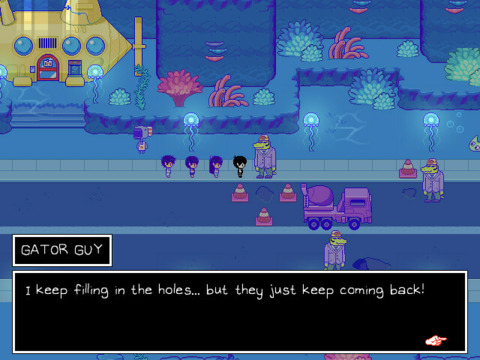
These elements are all great, but to me, any game following in Mother’s footsteps absolutely must maintain its spirit of writing. If you hadn’t noticed, comedy in games is really frickin’ hard to write! Very few can pull it off, and even then, jokes hit everyone differently. Thankfully, Omori maintains that sense of humor, and I love it. It takes the form of endless one-liners born from weird premises, where inscrutable NPCs sum up their whole being in one non-sequitur. Hilarious visual gags include a distressed enemy variation that simply has a huge axe duct-taped to its side. Most importantly, a huge amount of content is derived from character interaction.
Sense of character is one area that is unquestionably improved from what came before. The biggest weakness of the first two Mother games is how cardboard their party members are. They will get some establishing traits but are largely mute after that. Ninten and Ness are blank slates that can be hard to connect to. In the third game, this issue was fixed, but Omori takes it even further. The principal characters have clear personalities that lead to emotionally stirring arcs over the course of the game.
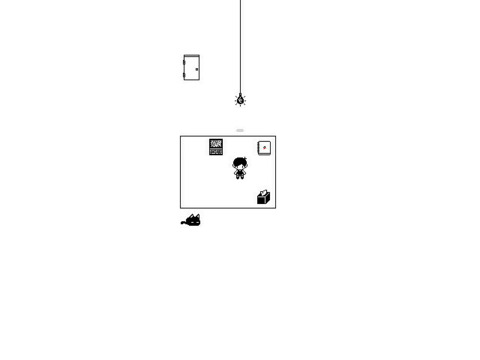
Omori himself is still a silent protagonist, but he has a lot more to latch onto. From the game’s first minute, we can see that he is an isolated, depressed kid with some uncomfortable images living in his mind. By the second minute, we see his fluorescent dream world, where his supportive friends constantly work to help him out of his shell. Digging into enemy descriptions, we can find that he has a bit of a judgmental streak. We’re encouraged to look into everyone’s tone when they address Omori. What makes a quiet boy like him stick with this group of outgoing kids? Omori’s difficulty reciprocating gestures from his friends is a charming and investing trait.
The other party members are constantly chatting. Exuberant Aubrey and sporty Kel compete and squabble, and it falls to charming Hero to be the adult of the group and reign everyone in. The writing really reflects how kids look at the world, accounting for subtleties like age difference. With a dream world setting, the conceit of the imaginary playground adventure has been perfectly captured. Initially, the main characters may seem defined by just a few things, but they are increasingly endearing. By the time things go south in the first hour, you would do anything to help these kids. You may or may not cry your eyes out when credits roll.
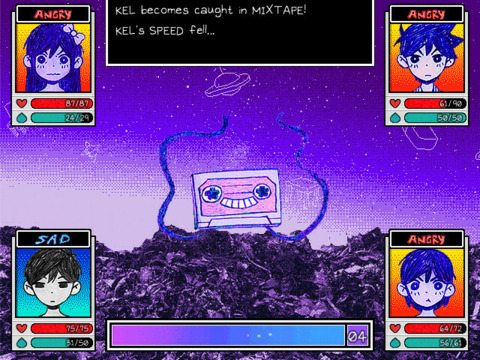
While party interactions play well in text boxes, they are also incorporated into the battle system in a refreshing way. When attacking, characters can use recharging energy to perform an additional action with a friend. Aubrey and Kel can egg each other on and get the angry status effect. Hero can offer quick healing with homemade cookies. Kel can get his attack powered up, hitting a single target with Aubrey or all enemies with Hero. Omori doesn’t work with his friends. Instead, he can attack twice or trip the enemy. When the party tries to help him in battle, he is humorously unreceptive at first. However, when the energy bar is maxed out, Omori can unleash the ultimate team-up attack, where we see his rare smile as he joins his friends. You probably won’t need to use it very often, so it’s a heartwarming moment when it happens.
Of course, all of the above is just part of what has kept the Mother series popular. Much of the rest are the decidedly bleak moments that tend to show up. Everyone who has finished Earthbound will never forget the unsettling imagery of the final area, and Mother 3 is an out-and-out tragedy. These moments take the games from “kiddy nonsense” to some of Nintendo’s darker titles. And if there’s any idea that Omori turns to eleven, it’s the creepy factor.
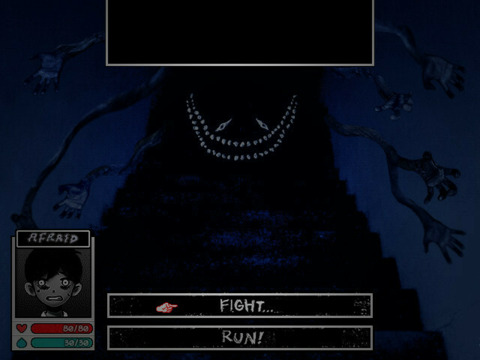
It’s billed on Steam as a psychological horror game with RPG elements. I would say that it’s vice-versa, as you can go hours at a time without finding anything unsettling. Still, it’s important to set those expectations on the store page and before the title screen. Plenty of disturbing imagery lurks around the game, increasing in frequency and discomfort as the climax approaches. Stuff happens in Omori that is truly fucked-up, but it is never played for cheap shock value. There is always a meaning behind the darkness. While it may not have been especially “scary” to me, it was constantly fascinating and motivated me to play to the end. A significant amount of content lies on the path to darker endings, which I will never experience because I cannot bear any more sadness for Omori and friends.
This is why I call Omori a “successor” to the Mother series. If unlikely circumstances ever lead to an official Mother 4 from Nintendo, they would still never be able to tackle these themes so directly. The games do a great job implying mature elements, but by dealing with them so prominently, Omori is all the more resonant as a piece of art. The juxtaposition of comedy and heartbreak is just as powerful today, especially with generations who grew up during and after Earthbound’s release. If you’re curious about the game, I think I’ve given it a pretty strong recommendation here, and somehow without talking about the story at all! The game is better the less you know, so I’ve tried to be sensitive. Beyond its resemblance to one of my favorite series, it’s a moving tale that stands on its own feet. Like the Mother series before it, the memories of Omori will stay with its players forever. For those who had worried that lineage would end, it’s a beautiful thing to see.

Log in to comment